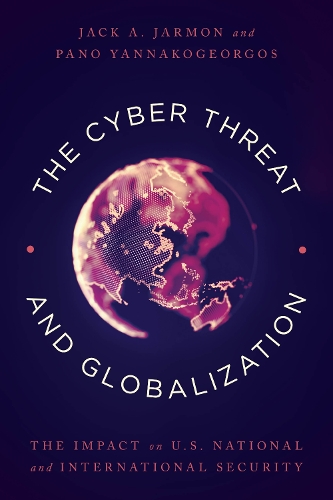
The Cyber Threat and Globalization: The Impact on U.S. National and International Security
(Hardback)
Available Formats
Publishing Details
The Cyber Threat and Globalization: The Impact on U.S. National and International Security
By (Author) Jack A. Jarmon
By (author) Pano Yannakogeorgos
Bloomsbury Publishing PLC
Rowman & Littlefield Publishers
26th June 2018
United States
Classifications
Tertiary Education
Non Fiction
363.325
Physical Properties
Hardback
280
Width 159mm, Height 237mm, Spine 14mm
476g
Description
In the post-industrial age, information is more valuable than territory and has become the main commodity influencing geopolitics today. The reliance of societies on cyberspace and information and communication technologies (ICTs) for economic prosperity and national security represents a new domain of human activity and conflict. Their potential as tools of social disruption and the low cost of entry of asymmetric conflict have forced a paradigm shift. The Cyber Threat and Globalization is designed for students of security studies and international relations, as well as security professionals who want a better grasp of the nature and existential threat of todays information wars. It explains policies and concepts, as well as describes the threats posed to the U.S. by disgruntled employees, hacktivists, criminals, terrorists, and hostile governments. Features Special textboxes provide vignettes and case studies to illustrate key concepts. Opinion pieces, essays, and extended quotes from noted subject matter experts underscore the main ideas. Written to be accessible to students and the general public, concepts are clear, engaging, and highly practical.
Reviews
Globalization and Cyber Security are both currently compelling topics. The first has been running for long enough to have acquired chameleon like characteristics making its consequences hard to interpret and the second, emerging somewhat later, but around for long enough to raise serious anxieties. The communications revolution which matured in the later 20th century has been the fundamental cause of these phenomena and this book makes that relationship very clear. In doing so, it creates a hitherto unfamiliar but vitally important context for linking and then learning about both. Such an achievement would be remarkable but less significant in its effect if it were not for the clarity and ingenuity of the books presentation. This is a seriously useful contribution neatly and effectively aimed at the appropriate educational level and will be of great interest to a more general readership as well. -- Richard Langhorne, Director of the Center for Global Studies, University of Buckingham; former Director of the Centre of International Studies, University of Cambridge; former Director and Chief Executive of Wilton Park Executive Agency, Foreign and Commonwealth Office of the British Government;
What does it mean to be secure in a hyper-connected world This book takes you on a journey through history and illuminates the evolution of the Internet and our networked society and all that threatens it. The authors are able to unpack the complex nature of ever-evolving cyber threats, and provide an easy-to-read yet deeply informative interpretation of how our modern way of life, from national security to commerce to communication, is threatened bycyber insecurity. We are reminded of Aristotles arguments that the state must assure the best interest of the community and then learn, page after page, about the depth of the policy, economic, social, and technological issues that entangle cyberspace and why so many different actors, especially China, Russia, and the United States, are trying to wield power, assert control, and gain economic, political, and military advantage in and through cyberspace. Knowing that history can inform the future, the authors present a well-researched overview of the next generation technologies that will continue to confound policy makers, statesmen, security practitioners, and military leaders, and destabilize our economies, democracies, and society writ large.This book provides a foundational understanding of how cyberspace has transformed the nature of national security, global conflict, and international relations, and will be relevant for years to come. -- Melissa Hathaway, President, Hathaway Global Strategies; former cyber advisor to Presidents George W. Bush and Barack H. Obama
Author Bio
Jack Jarmon has taught international relations courses at the University of Pennsylvania, the John C. Whitehead School of Diplomacy and International Relations at Seton Hall University, and Rutgers University where he was also Associate Director of the Command, Control and Interoperability Center for Advanced Data Analysis a Center of Excellence of the Department of Homeland Security, Science and Technology Division. Pano Yannakogeorgos is Dean of the Air University Cyber College. Previously, he taught at Rutgers University Division of Global Affairs, and served as an Adviser within the United Nations Security Council.
